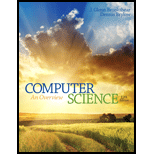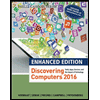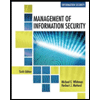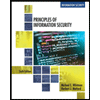
Computer Science: An Overview (12th Edition)
12th Edition
ISBN: 9780133760064
Author: Glenn Brookshear, Dennis Brylow
Publisher: PEARSON
expand_more
expand_more
format_list_bulleted
Question
Chapter 4.5, Problem 4QE
Program Plan Intro
Public-key encryption:
It is a cryptographic system that uses two keys one is the public key and the other is the secret key that is known to the recipient message. There is an element in the public-key and the private keys are related to each other such that public key is used to encrypt messages and the private key can only be used to decrypt them.
Traditional encryption:
It is a method which takes the original message and a small piece of information arrange in advance between the sender and receiver and creates the encoded version of the message.
Expert Solution & Answer
Want to see the full answer?
Check out a sample textbook solution
Students have asked these similar questions
Need help making python code for this!
2.7 LAB: Smallest of two numbers
Instructor note:
Note: this section of your textbook contains activities that you will complete for points. To ensure your work is scored, please access this page from the assignment link provided in the CTU Virtual Campus. If you did not access this page via the CTU Virtual Campus, please do so now.
I help understanding this question
d'y + 4dy +3y = a, Initial Conditions: y(0) = 5 & y'(0)=0
Where a = 10
a) Find y(t) =yh(t) +yp(t) in time domainIs the system over-damped, under-damped, or critical?
b) Find y(t) using Laplace Transforms
Chapter 4 Solutions
Computer Science: An Overview (12th Edition)
Ch. 4.1 - What is an open network?Ch. 4.1 - Prob. 2QECh. 4.1 - What is a router?Ch. 4.1 - Prob. 4QECh. 4.1 - Prob. 5QECh. 4.1 - Prob. 6QECh. 4.2 - Prob. 1QECh. 4.2 - Prob. 2QECh. 4.2 - Prob. 3QECh. 4.2 - Prob. 4QE
Ch. 4.2 - Prob. 5QECh. 4.2 - Prob. 6QECh. 4.2 - Prob. 7QECh. 4.2 - Prob. 8QECh. 4.3 - Prob. 1QECh. 4.3 - Prob. 2QECh. 4.3 - Prob. 3QECh. 4.3 - Prob. 4QECh. 4.3 - Prob. 5QECh. 4.4 - Prob. 1QECh. 4.4 - Prob. 2QECh. 4.4 - Prob. 3QECh. 4.4 - What keeps a computer on the Internet from...Ch. 4.5 - Prob. 1QECh. 4.5 - Prob. 2QECh. 4.5 - Prob. 3QECh. 4.5 - Prob. 4QECh. 4.5 - Prob. 5QECh. 4 - Prob. 1CRPCh. 4 - Prob. 2CRPCh. 4 - Prob. 3CRPCh. 4 - Prob. 4CRPCh. 4 - Prob. 5CRPCh. 4 - Prob. 6CRPCh. 4 - Prob. 7CRPCh. 4 - Prob. 8CRPCh. 4 - Prob. 9CRPCh. 4 - Prob. 10CRPCh. 4 - Prob. 11CRPCh. 4 - Prob. 12CRPCh. 4 - Prob. 13CRPCh. 4 - Prob. 14CRPCh. 4 - Prob. 15CRPCh. 4 - Prob. 16CRPCh. 4 - Prob. 17CRPCh. 4 - Prob. 18CRPCh. 4 - Prob. 19CRPCh. 4 - Prob. 20CRPCh. 4 - Prob. 21CRPCh. 4 - Prob. 22CRPCh. 4 - Prob. 23CRPCh. 4 - Prob. 24CRPCh. 4 - Prob. 25CRPCh. 4 - Prob. 26CRPCh. 4 - Prob. 27CRPCh. 4 - Prob. 28CRPCh. 4 - Prob. 29CRPCh. 4 - Prob. 30CRPCh. 4 - Prob. 31CRPCh. 4 - Prob. 32CRPCh. 4 - Prob. 33CRPCh. 4 - Prob. 34CRPCh. 4 - Prob. 35CRPCh. 4 - Prob. 36CRPCh. 4 - Prob. 37CRPCh. 4 - Prob. 38CRPCh. 4 - Prob. 39CRPCh. 4 - Prob. 40CRPCh. 4 - Prob. 41CRPCh. 4 - Prob. 42CRPCh. 4 - Prob. 43CRPCh. 4 - Prob. 44CRPCh. 4 - Prob. 45CRPCh. 4 - Prob. 46CRPCh. 4 - Prob. 47CRPCh. 4 - Prob. 48CRPCh. 4 - Prob. 49CRPCh. 4 - Prob. 50CRPCh. 4 - Prob. 1SICh. 4 - Prob. 2SICh. 4 - Prob. 3SICh. 4 - Prob. 4SICh. 4 - Prob. 5SICh. 4 - Prob. 6SICh. 4 - Prob. 7SICh. 4 - Prob. 8SICh. 4 - Prob. 9SICh. 4 - Prob. 10SICh. 4 - Prob. 11SICh. 4 - Prob. 12SI
Knowledge Booster
Similar questions
- Given f(t)=a sin(ßt) a = 10 & ß = 23 Find the Laplace Transform using the definition F(s) = ∫f(t)e-stdtarrow_forwardPlease do not use any AI tools to solve this question. I need a fully manual, step-by-step solution with clear explanations, as if it were done by a human tutor. No AI-generated responses, please.arrow_forwardObtain the MUX design for the function F(X,Y,Z) = (0,3,4,7) using an off-the-shelf MUX with an active low strobe input (E).arrow_forward
- I cannot program smart home automation rules from my device using a computer or phone, and I would like to know how to properly connect devices such as switches and sensors together ? Cisco Packet Tracer 1. Smart Home Automation:o Connect a temperature sensor and a fan to a home gateway.o Configure the home gateway so that the fan is activated when the temperature exceedsa set threshold (e.g., 30°C).2. WiFi Network Configuration:o Set up a wireless LAN with a unique SSID.o Enable WPA2 encryption to secure the WiFi network.o Implement MAC address filtering to allow only specific clients to connect.3. WLC Configuration:o Deploy at least two wireless access points connected to a Wireless LAN Controller(WLC).o Configure the WLC to manage the APs, broadcast the configured SSID, and applyconsistent security settings across all APs.arrow_forwardusing r language for integration theta = integral 0 to infinity (x^4)*e^(-x^2)/2 dx (1) use the density function of standard normal distribution N(0,1) f(x) = 1/sqrt(2pi) * e^(-x^2)/2 -infinity <x<infinity as importance function and obtain an estimate theta 1 for theta set m=100 for the estimate whatt is the estimate theta 1? (2)use the density function of gamma (r=5 λ=1/2)distribution f(x)=λ^r/Γ(r) x^(r-1)e^(-λx) x>=0 as importance function and obtain an estimate theta 2 for theta set m=1000 fir the estimate what is the estimate theta2? (3) use simulation (repeat 1000 times) to estimate the variance of the estimates theta1 and theta 2 which one has smaller variance?arrow_forwardusing r language A continuous random variable X has density function f(x)=1/56(3x^2+4x^3+5x^4).0<=x<=2 (1) secify the density g of the random variable Y you find for the acceptance rejection method. (2) what is the value of c you choose to use for the acceptance rejection method (3) use the acceptance rejection method to generate a random sample of size 1000 from the distribution of X .graph the density histogram of the sample and compare it with the density function f(x)arrow_forward
- using r language a continuous random variable X has density function f(x)=1/4x^3e^-(pi/2)^4,x>=0 derive the probability inverse transformation F^(-1)x where F(x) is the cdf of the random variable Xarrow_forwardusing r language in an accelerated failure test, components are operated under extreme conditions so that a substantial number will fail in a rather short time. in such a test involving two types of microships 600 chips manufactured by an existing process were tested and 125 of them failed then 800 chips manufactured by a new process were tested and 130 of them failed what is the 90%confidence interval for the difference between the proportions of failure for chips manufactured by two processes? using r languagearrow_forwardI want a picture of the tools and the pictures used Cisco Packet Tracer Smart Home Automation:o Connect a temperature sensor and a fan to a home gateway.o Configure the home gateway so that the fan is activated when the temperature exceedsa set threshold (e.g., 30°C).2. WiFi Network Configuration:o Set up a wireless LAN with a unique SSID.o Enable WPA2 encryption to secure the WiFi network.o Implement MAC address filtering to allow only specific clients to connect.3. WLC Configuration:o Deploy at least two wireless access points connected to a Wireless LAN Controller(WLC).o Configure the WLC to manage the APs, broadcast the configured SSID, and applyconsistent security settings across all APs.arrow_forward
- A. What will be printed executing the code above?B. What is the simplest way to set a variable of the class Full_Date to January 26 2020?C. Are there any empty constructors in this class Full_Date?a. If there is(are) in which code line(s)?b. If there is not, how would an empty constructor be? (create the code lines for it)D. Can the command std::cout << d1.m << std::endl; be included after line 28 withoutcausing an error?a. If it can, what will be printed?b. If it cannot, how could this command be fixed?arrow_forwardCisco Packet Tracer Smart Home Automation:o Connect a temperature sensor and a fan to a home gateway.o Configure the home gateway so that the fan is activated when the temperature exceedsa set threshold (e.g., 30°C).2. WiFi Network Configuration:o Set up a wireless LAN with a unique SSID.o Enable WPA2 encryption to secure the WiFi network.o Implement MAC address filtering to allow only specific clients to connect.3. WLC Configuration:o Deploy at least two wireless access points connected to a Wireless LAN Controller(WLC).o Configure the WLC to manage the APs, broadcast the configured SSID, and applyconsistent security settings across all APs.arrow_forwardTransform the TM below that accepts words over the alphabet Σ= {a, b} with an even number of a's and b's in order that the output tape head is positioned over the first letter of the input, if the word is accepted, and all letters a should be replaced by the letter x. For example, for the input aabbaa the tape and head at the end should be: [x]xbbxx z/z,R b/b,R F ① a/a,R b/b,R a/a, R a/a,R b/b.R K a/a,R L b/b,Rarrow_forward
arrow_back_ios
SEE MORE QUESTIONS
arrow_forward_ios
Recommended textbooks for you
 Enhanced Discovering Computers 2017 (Shelly Cashm...Computer ScienceISBN:9781305657458Author:Misty E. Vermaat, Susan L. Sebok, Steven M. Freund, Mark Frydenberg, Jennifer T. CampbellPublisher:Cengage Learning
Enhanced Discovering Computers 2017 (Shelly Cashm...Computer ScienceISBN:9781305657458Author:Misty E. Vermaat, Susan L. Sebok, Steven M. Freund, Mark Frydenberg, Jennifer T. CampbellPublisher:Cengage Learning Management Of Information SecurityComputer ScienceISBN:9781337405713Author:WHITMAN, Michael.Publisher:Cengage Learning,
Management Of Information SecurityComputer ScienceISBN:9781337405713Author:WHITMAN, Michael.Publisher:Cengage Learning, Principles of Information Security (MindTap Cours...Computer ScienceISBN:9781337102063Author:Michael E. Whitman, Herbert J. MattordPublisher:Cengage Learning
Principles of Information Security (MindTap Cours...Computer ScienceISBN:9781337102063Author:Michael E. Whitman, Herbert J. MattordPublisher:Cengage Learning Principles of Information Systems (MindTap Course...Computer ScienceISBN:9781285867168Author:Ralph Stair, George ReynoldsPublisher:Cengage Learning
Principles of Information Systems (MindTap Course...Computer ScienceISBN:9781285867168Author:Ralph Stair, George ReynoldsPublisher:Cengage Learning A+ Guide To It Technical SupportComputer ScienceISBN:9780357108291Author:ANDREWS, Jean.Publisher:Cengage,
A+ Guide To It Technical SupportComputer ScienceISBN:9780357108291Author:ANDREWS, Jean.Publisher:Cengage,

Enhanced Discovering Computers 2017 (Shelly Cashm...
Computer Science
ISBN:9781305657458
Author:Misty E. Vermaat, Susan L. Sebok, Steven M. Freund, Mark Frydenberg, Jennifer T. Campbell
Publisher:Cengage Learning

Management Of Information Security
Computer Science
ISBN:9781337405713
Author:WHITMAN, Michael.
Publisher:Cengage Learning,


Principles of Information Security (MindTap Cours...
Computer Science
ISBN:9781337102063
Author:Michael E. Whitman, Herbert J. Mattord
Publisher:Cengage Learning

Principles of Information Systems (MindTap Course...
Computer Science
ISBN:9781285867168
Author:Ralph Stair, George Reynolds
Publisher:Cengage Learning

A+ Guide To It Technical Support
Computer Science
ISBN:9780357108291
Author:ANDREWS, Jean.
Publisher:Cengage,